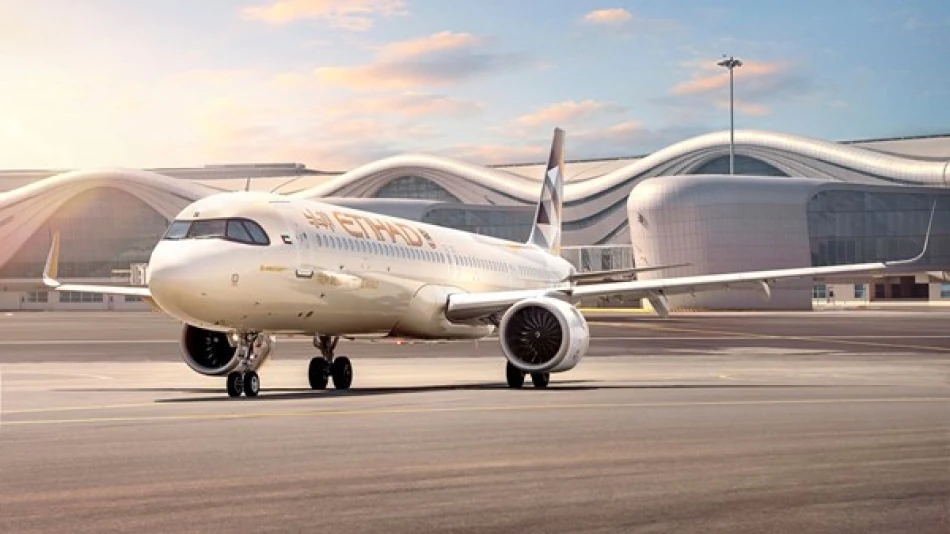
Zayed International Airport: Gateway to Aviation Growth and Prosperity
Abu Dhabi Airport Emerges as Middle East's Fastest-Growing Aviation Hub
Zayed International Airport is positioning itself as the Middle East's most dynamic aviation gateway, with scheduled airline capacity set to surge 16.6% in the second half of 2024. This explosive growth, driven by Etihad Airways' aggressive expansion and the UAE's open skies policy, signals Abu Dhabi's determination to challenge Dubai's aviation dominance while capitalizing on the region's post-pandemic travel boom.
Capacity Surge Outpaces Regional Competitors
According to OAG International data, Zayed International Airport's scheduled seat capacity will reach 10.27 million seats in the second half of 2024, compared to 8.89 million in the same period last year. This 16.6% growth rate significantly outpaces regional competitors and positions Abu Dhabi as the fifth-largest airport in the Middle East by seat capacity.
The airport's impressive infrastructure—capable of handling 45 million passengers annually and accommodating 79 aircraft simultaneously—provides the foundation for this rapid expansion. For 2025, projections indicate continued momentum with a 14.8% annual growth rate, pushing total capacity to 19.54 million seats.
Etihad's Strategic Network Expansion
The growth trajectory aligns perfectly with Etihad Airways' ambitious expansion plans. The UAE's national carrier announced seven additional destinations for 2025, bringing its total new routes to 27 for the year. These include strategically chosen markets: Almaty, Baku, Bucharest, Medina, Tbilisi, Tashkent, and Yerevan.
This expansion strategy reflects a calculated approach to capture underserved markets in Central Asia, Eastern Europe, and the Arabian Peninsula. By targeting these emerging destinations, Etihad is positioning Abu Dhabi as a natural transit hub for travelers between Asia, Europe, and the Middle East.
Market Timing and Competitive Positioning
The timing of this expansion is particularly shrewd. While Dubai International Airport faces capacity constraints and ongoing construction at Al Maktoum International, Abu Dhabi is capitalizing on available infrastructure to capture market share. The addition of eight new airlines in 2024 demonstrates the airport's appeal to international carriers seeking alternatives to congested regional hubs.
Record-Breaking Performance Metrics
Abu Dhabi's airports collectively handled 29.4 million passengers in 2024, representing a substantial 28.1% increase from 2023's 22.9 million. This growth significantly exceeds global aviation recovery rates and positions the emirate among the world's fastest-growing aviation markets.
Aircraft movements increased by 10% to 249,747 flights across Abu Dhabi's five airports, indicating robust demand from both passengers and cargo operations. The launch of 29 new destinations in 2024 expanded the network to over 125 global destinations, creating a comprehensive connectivity web.
Strategic Implications for Regional Aviation
Abu Dhabi's aviation surge represents more than simple capacity expansion—it signals a fundamental shift in Middle Eastern aviation dynamics. The emirate's open skies policy provides unlimited opportunities for ambitious carriers, contrasting with more restrictive approaches in neighboring markets.
This growth pattern mirrors successful aviation hub strategies employed by Singapore and Amsterdam, where liberal aviation policies and strategic geographic positioning created thriving transfer markets. Abu Dhabi's approach suggests confidence in capturing both point-to-point traffic and transit passengers traveling between Asia, Europe, and Africa.
Investment and Infrastructure Outlook
The rapid expansion places Abu Dhabi in direct competition with established Middle Eastern hubs while creating new opportunities for international airlines. The UAE's broader economic diversification strategy, emphasizing tourism, trade, and logistics, provides strong fundamentals supporting continued aviation growth.
For investors and industry observers, Abu Dhabi's aviation sector represents a compelling growth story backed by substantial infrastructure investment and strategic government support. The emirate's ability to sustain double-digit growth rates while maintaining operational efficiency will determine its long-term success in the increasingly competitive regional aviation market.
Most Viewed News

 Layla Al Mansoori
Layla Al Mansoori






